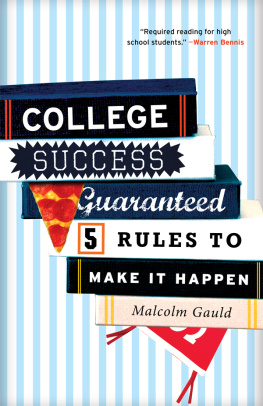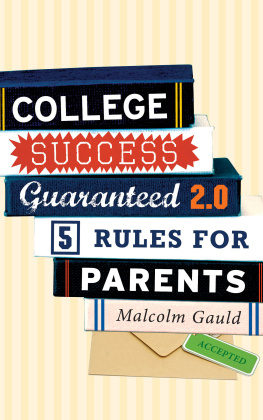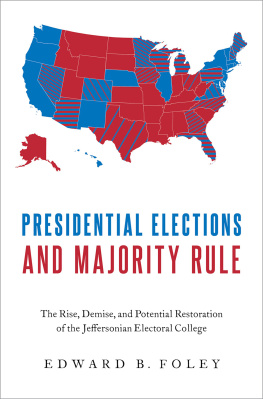College Success Guaranteed
5 Rules to Make It Happen
Malcolm Gauld
ROWMAN & LITTLEFIELD EDUCATION
A division of
Rowman & Littlefield Publishers, Inc.
Lanham New York Toronto Plymouth, UK
Published by Rowman & Littlefield Education
A division of Rowman & Littlefield Publishers, Inc.
A wholly owned subsidiary of
The Rowman & Littlefield Publishing Group, Inc.
4501 Forbes Boulevard, Suite 200, Lanham, Maryland 20706
http://www.rowmaneducation.com
Estover Road, Plymouth PL6 7PY, United Kingdom
Copyright 2011 by Malcolm Gauld
All rights reserved . No part of this book may be reproduced in any form or by any electronic or mechanical means, including information storage and retrieval systems, without written permission from the publisher, except by a reviewer who may quote passages in a review.
British Library Cataloguing in Publication Information Available
Library of Congress Cataloging-in-Publication Data
Gauld, Malcolm, 1954
College success guaranteed : 5 rules to make it happen / Malcolm Gauld.
p. cm.
ISBN 978-1-61048-042-0 (pbk. : alk. paper)
ISBN 978-1-61048-043-7 (electronic)
College student orientation. Study skills. I. Title.
LB2343.3.G39 2011
378.1'98dc22 2011005704
 The paper used in this publication meets the minimum requirements of American National Standard for Information SciencesPermanence of Paper for Printed Library Materials, ANSI/NISO Z39.48-1992.
The paper used in this publication meets the minimum requirements of American National Standard for Information SciencesPermanence of Paper for Printed Library Materials, ANSI/NISO Z39.48-1992.
Printed in the United States of America
To Mike Dawes
A great teacher and student of life who taught me that
if you want to have a friend, youve got to be a friend.
William Haefeli/The New Yorker Collection/www.cartoonbank.com
Congratulations!!!
So, youre headed off to college . . . Congratulations! Looks like those twelve-plus years of school are about to pay off . . . Big Time! You should feel proud.
So, tell me, are you ready? I mean, really ready?
Before you answer, I feel compelled to warn you that a lot of things have changed since I was in college in the mid-70s. (And in case youre wondering, No , I was not ready .) Without offering up a list here, Ill just point out what is maybe the most glaring difference: The Cost . . . has increased . . . more than tenfold .
To dramatically illustrate, my daughter and I share the same alma mater. What my parents spent (combined with my college loans) to send me there for one year will not cover my daughters costs . . . for one month .
So, back to the readiness question: Are you ready?
No? Then this book offers a simple track to run on. Hope it helps. (I also hope that you dont see my point about the cost as the start of a guilt trip. No more, I promise.)
Yes? Before you dismiss this book as an inappropriate high school graduation gift from someone who obviously doesnt know me, why not consider it a quick and easy safety check?
But while were on yesand not to burst your bubble, but . . . how do you know for sure that your Readiness Detector is working? In other words, how do you know for sure that you really know whether youre ready or not?
I have taught and coached teenagers for over three decades and have watched thousands of them go off to college. Some just take off like rockets from the get-go. Others either fail to launch or crash-and-burn before midterms. Of the latter group, most simply could not summon the discipline to get their act together in order to do what they were supposed to do. However, there were some who were willing to do the work, but simply did not know how to organize themselves now that Mom and/or Dad was not around to hold their feet to the fire. Independent time-management is key.
Although I have given up trying to predict how my students will fare when they head off to college, I have often found myself wishing I could have offered more assistance to those who found out too late that their Readiness Detector had let them down by showing a false positive reading. Some of these have sadly found themselves back in their high school living arrangement (i.e., Mom, Dad, and the whole nine yards) with one difference: no school to go to.
Several years ago I began giving a talk to high school seniors a few days before they were to graduate. I called it my 5 Rules for College Survival Talk. Thats what this book is about.
In many ways, the book has been inspired by the looks on the faces of the students I have watched return to visit after their first year of college. Some look and seem to exude the feel of vibrant, conquering heroes. Others look and feel . . . well, pretty bummed out. Folks in the first group often say, You know, those Five Rules helped me out a lot. Folks in the latter group often mumble something about having fallen off the path. No matter where you fall, I hope this book offers a simple and helpful track to run on, especially in the early going.
That track involves five simple rules that are easy to understand and not all that hard to follow once you commit to them. Im not claiming that they are all of equal value. As a matter of fact, not only is Rule #1 the hands-down most important of all, it might even be more important than the other four combined. You might even be able to skip one of these rules. (Rule #4 comes to mind, but dont even think about skipping Rule #1!)
I do claim that anyone absolutely anyone can follow these rules. Think about it. Not everyone can make straight As, or graduate magna cum laude , or make deans list. But everyone and anyone can follow these rules.
I suspect you will wind up modifying some of the rules in order to suit your learning style or lifestyle preferences. Youll just want to be sure that whatever modifications you ultimately choose to make are based on an objective and accurate understanding of what works (and does not work) best for you. Until you have that understanding, know that I have never encountered anyone who went wrong following these Five Rules as they are presented in this book.
A Few Words on Bullshit
And when it comes to that understanding, the lifelong teacher in me cant resist going around the bases one more time. I often tell my teenage students that Man is the only animal in the forest that bullshits himself. Think about it.
Animals pretty much serve their best interests on a daily basis. They generally:
Sleep when theyre tired
Eat a healthy diet
Keep trim and stay in good physical condition
Have no problems with procrastination
Have a healthy and responsible sex life
And so forth
Men and women, on the other hand, often have trouble with the above to say nothing of other issues, especially when it comes to:
Eating and drinking the right things
Getting enough sleep
Maintaining exercise routines
Sticking to schedules
Over-spending
And so forth
Animals in the wild never have those problems. (They also dont smoke . . . anything.) Not only do men and women have those problems on an all-too-frequent basis, we often delude ourselves into believing that we dont have them when we most certainly do. For some of us it can be as simple as trying to feel good about offsetting a high-fat-content fast-food lunch with a diet cola. For others it might be I never drink before 5 and making up for lost time as soon as the hour strikes. (Chances are youve heard the joke about the guy who says, Hey, its 5 oclock somewhere in the world as he chugs an early afternoon draft brewski.)
By the time we hit college, most of us have developed sensors to help us detect bullshit when it is being served up to us by others. However, we sometimes fall short when it comes to detecting our propensity to serve it up to . . . ourselves. For many, college is the first place where this life skill becomes critical for surviving, much less thriving.









 The paper used in this publication meets the minimum requirements of American National Standard for Information SciencesPermanence of Paper for Printed Library Materials, ANSI/NISO Z39.48-1992.
The paper used in this publication meets the minimum requirements of American National Standard for Information SciencesPermanence of Paper for Printed Library Materials, ANSI/NISO Z39.48-1992.